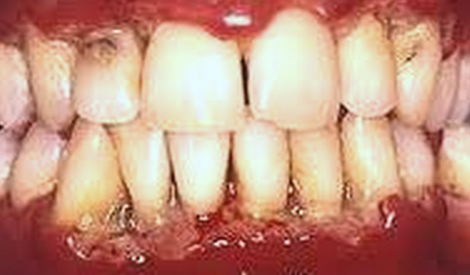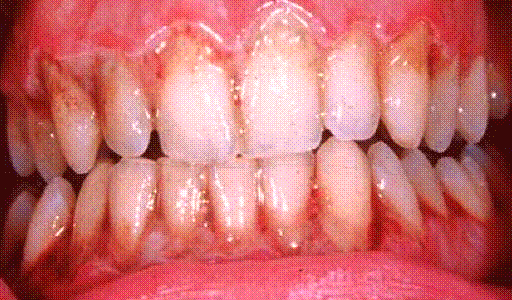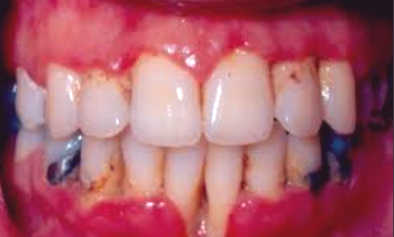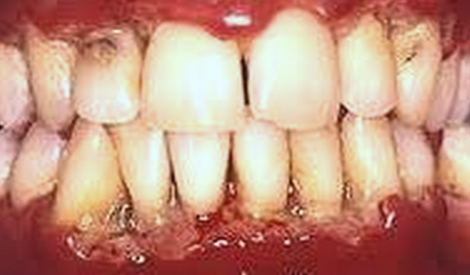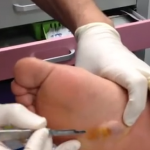Trench mouth is a name given to a serious type of gingivitis, wherein patients suffer from bleeding, pain, and infection of the gums as well as ulcer formation in the mouth.The disease is not common in developed countries, but is however prevalent in developing nations with bad living conditions and malnutrition.
Trench mouth is also referred to by other names such as ANUG/acute necrotizing ulcerative gingivitis, Vincent’s stomatitis,and NUG/necrotizing ulcerative gingivitis.The dental condition was widespread amongst World War I soldiers who were trapped in trenches with no access to any kind of dental care. It is the reason why the disease is named thus, that is, trench mouth.
Symptoms of trench mouth
Listed below are some of the common signs and symptoms of trench mouth:
- The gums may experience redness and swelling.
- The gums may be very painful.
- The gums tend to bleed even when touched softly.
- The gums may be enclosed in a thin layer of greyish coat.
- Swelling of the lymph nodes present in the head, neck, and jaw areas.
- Sores or crater-like ulcers may develop in the areas between teeth as well as on the gums.
- Bad breath is common.
- Patients may experience a perennial foul taste in the mouth.
- Eating and swallowing food may cause severe pain.
- Some patients may suffer from fever.
Causes of trench mouth
The human mouth is home to different kinds of bacteria, fungi, and viruses. They live there without causing harm. Trench mouth is caused due to rapid and uncontrolled growth of oral bacteria, which eventually results in infection of the gums.
Severe bacterial infection of the mouth region can harm or damage the gingival, a fragile gum tissue which performs the function of supporting and covering the teeth. With the passage of time, big ulcers full of rotting tissue, food particles, and bacteria form on the gums, which in turn leads to bad breath, extreme pain, and foul taste in the mouth.
The manner in which excess bacteria cause the widespread damage linked with trench mouth is not known. It is however theorized that enzymes and toxic chemicals secreted by the bacteria may be a factor.
Both the young and old can suffer from a case of trench mouth. Most instances have however been noticed in young adults in their twenties and thirties. Widespread malnourishment and lack of basic oral care rampant in developing nations are the primary cause of trench mouth in young children in such countries.
A few risk factors that can contribute towards development of trench mouth are mentioned below:
- People with poor oral hygiene wherein they do not floss and brush everyday are prone to accumulation of plaque and food debris, which in turn provide the right environment for bacterial growth.
- Gingivitis as well as other pre-existing infections of the mouth, throat, and teeth can get aggravated with newer infections and eventually advance into trench mouth. This is more the case when the active oral diseases are not treated.
- Chewing tobacco and smoking can damage the blood vessels present in the gums. This can help the growth of bacteria.
- A weakened immune system cannot efficiently fight off infections in the mouth. Hence, people with impaired immune systems, such as those taking medications to suppress the immune system, and HIV, cancer, and mononucleosis patients are more susceptible to developing trench mouth.
- Increased stress can also have an adverse effect on the immune system. This allows bacteria to thrive and grow, thereby laying the foundations for trench mouth.
- A malnourished body is also incapable of defending itself against infections. Hence, people with limited or no access to essential nutrients are also at risk to developing trench mouth.
Treatment of trench mouth
Trench mouth is fully curable and with proper treatment complete healing mostly occurs in only 2 weeks. It may however be noted that HIV/AIDS patients and those with compromised immune systems will experience full remission of trench mouth after a month or more.
Some of the treatment options for trench mouth are as follows:
Medications
- Trench is caused due to proliferation of bacteria. The pathogens are killed with antibiotics.
- Severe pain associated with trench mouth can be eased with pain killers. It is important to decrease the pain as doing so will allow patients to resume proper oral hygiene practices like daily brushing and flossing, as well as intake of food without problems.
- Topical pain medications to be applied directly on the gums may sometimes be prescribed by your health care provider.
Gum and teeth cleaning
- Cleaning of gums and teeth involves removal of debris. This helps in reduction of oral pain and tenderness.
- Alleviation of pain also facilitates carrying out other dental procedures like root planning and scaling, wherein tartar and plaque occurring beneath the gum-line are removed and the coarse areas on the teeth are smoothened.
Surgery
- Patients with extensive tooth and gum damage due to trench mouth may need to undergo corrective and reconstructive surgery.
It is important for patients to diligently follow correct oral hygiene after full cure of trench mouth to prevent a relapse.
Trench Mouth Pictures
